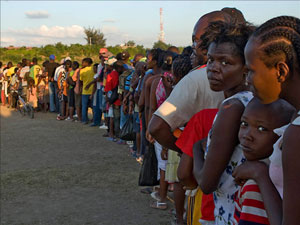President promises help, Caucus member seeks debt relief for Haiti
By Askia Muhammad -Senior Correspondent- | Last updated: Mar 24, 2010 - 2:05:49 PMWhat's your opinion on this article?

Haitians displaced by the massive earthquake that devastated their country form a long line to wait for UN-distributed meals. Photo: United Nations/un.org
|
Mr. Obama pledged to help Haiti rebuild following the devastating earthquake. “As President Préval and I discussed, the situation on the ground remains dire, and people should be under no illusions that the crisis is over. Many Haitians are still in need, desperate need in some cases, of shelter and food and medicine. And with the spring rains approaching, those needs will only grow. The challenge now is to prevent a second disaster.
“This pledge is one that I made at the beginning of this crisis, and I intend for America to keep our pledge,” Mr. Obama said. “America will be your partner in the recovery and reconstruction efforts.”
The core of Mr. Preval's plan—for which he wants U.S. support—is to establish an international trust fund where donors, including nations, non profit and advocacy groups could contribute. “We talked about this, and I know we can already count on your support,” Mr. Preval said, “to be the advocate of that idea during this conference to support our vision.”
Just ahead of Mr. Préval's visit, the Senate approved a resolution urging the U.S. representative at major international lending institutions to push for the cancellation of all of Haiti's outstanding multilateral debt—about $700 million—or about two-thirds of the country's total outstanding debt of some $1.2 billion.
The House of Representatives also passed its Debt Relief for Earthquake Recovery in Haiti Act, authored by Rep. Maxine Waters (D-Calif.). The legislation directs the U.S. to seek the cancellation of Haiti's debts to the World Bank, the International Monetary Fund, the Inter-American Development Bank and other multilateral development institutions.
“Every time you eliminate their need to pay debt,” Rep. Waters said in a broadcast interview, “that's more money that they have to deal with health and education and infrastructure, so debt relief is very important for them. That just gives them more money to work with.”
“I am pleased that my bill to cancel Haiti's debt held by multilateral development institutions is set to become law,” Rep. Waters said. “Debt relief is essential for Haiti's future. However, we must also keep in mind the immediate needs of survivors who, without adequate shelter, will be further subjected to the elements and to disease during the upcoming rainy season. I applaud the efforts of our government, military, and charitable organizations for the assistance they have provided thus far, and I will be doing everything in my power to continue to work with them to alleviate the suffering and attend to the basic needs of the Haitian people.”
There is a perceived limit to U.S. “generosity” however. In an interview with the Washington Post, Mr. Préval said congressional leaders gave a cool reception to his request for help in overcoming a projected $350 million budget shortfall.
Meanwhile, two weeks after the earthquake, the Associated Press reported the Haitian government is receiving less than a penny for each dollar the United States spends on aid efforts in Haiti. And of that, 33 cents of every dollar was going to military assistance, more than three times the nine cents of every dollar spent on food.
Mr. Préval's meeting with President Obama focused on how the U.S. can contribute, primarily through development planning and debt relief. The Haitian government, along with aid organizations and international leaders, is starting to plan reconstruction.
Leonie Hemantin is deputy director of the Lambi Fund of Haiti, who attended President Préval's meeting with President Obama. Relief agencies must look outside Port Au Prince to the rural areas where a majority of the population lives, she told Free Speech Radio News.
“We cannot survive as a country when we have 60 percent of our population without access to these most basic rights. Access to water, access to education, access to healthcare. That's a basic human right.”
At least 200,000 Haitians are estimated to have died as a result of the January 12 earthquake and thousands are still in need of shelter and food. The earthquake cost $14 billion damage to the economy and may take that much again to rebuild, according to the Inter-American Development Bank.
In early projections based on other recent natural catastrophes released last month, the Inter-American Development Bank estimated that reconstruction costs in Haiti are likely to range from $8 billion to $14 billion. The same study predicted that the earthquake “is likely to be the most destructive natural disaster in modern times, when viewed in relations to the size of Haiti's population and its economy.”
INSIDE STORIES AND REVIEWS
-
-
About Harriett ... and the Negro Hollywood Road Show
By Rabiah Muhammad, Guest Columnist » Full Story -
Skepticism greets Jay-Z, NFL talk of inspiring change
By Bryan 18X Crawford and Richard B. Muhammad The Final Call Newspaper @TheFinalCall » Full Story -
The painful problem of Black girls and suicide
By Charlene Muhammad -National Correspondent- » Full Story -
Exploitation of Innocence - Report: Perceptions, policies hurting Black girls
By Charlene Muhammad -National Correspondent- » Full Story -
Big Ballin: Big ideas fuel a father’s Big Baller Brand and brash business sense
By Bryan Crawford -Contributing Writer- » Full Story






 Click Here Stay Connected!
Click Here Stay Connected!








